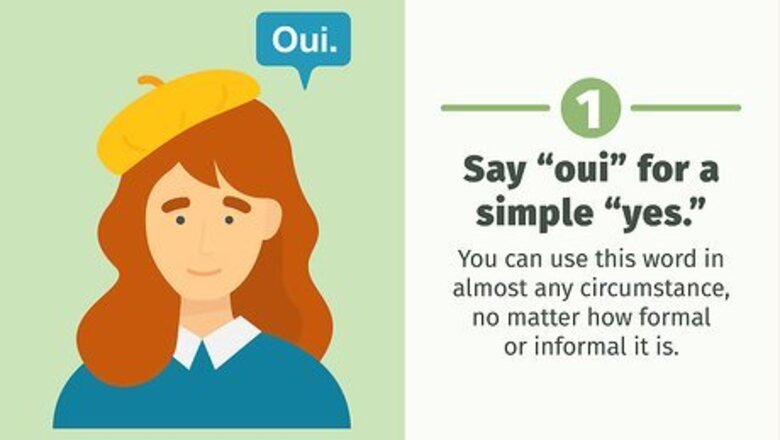
views
Basic Yes
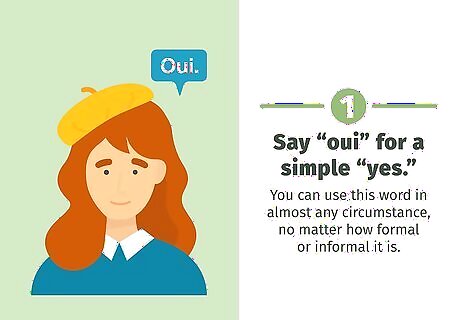
Say “oui” for a simple “yes.” You can use this word in almost any circumstance, no matter how formal or informal it is. Pronounce this word by saying “wee.” If you want to make this response more polite, you can add the French equivalent of “mister,” “missus,” or “miss” to the end of the term. Monsieur, pronounced muh-see-euh, translates into “mister.” Oui, monsieur. Madame, pronounced mah-dehm, translates into “missus.” Oui, madame. Mademoiselle, pronounced mah-dehm-mwah-zel, translates into “miss.” Oui, mademoiselle.
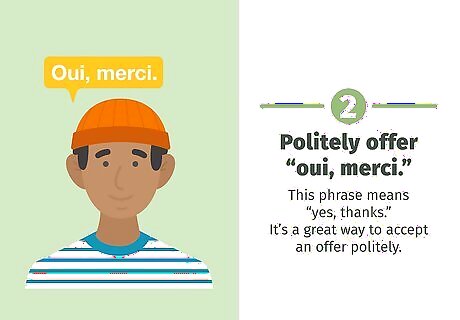
Politely offer “oui, merci.” This phrase means “yes, thanks.” It’s a great way to accept an offer politely. You should pronounce it like, “WEE, mare-SEE.” Merci means “thanks” or “thank you.”
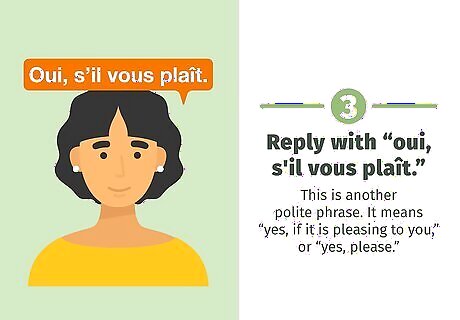
Reply with “oui, s'il vous plaît.” This is another polite phrase. It means “yes, if it is pleasing to you,” or “yes, please.” Pronounce it like, WEE, sill voo PLEH. S'il means “if.” Vous means “you.” Plaît means “please.”
Informal Yes

Casually respond with “ouais.” This is the French equivalent of the English “yeah.” Pronounce it like oo-way. You should only use this in informal situations, like when you’re talking to your friends.

Use “ouaip” instead. This is the French equivalent of the English “yep.” It should be pronounced like oo-wayp. This word is slightly less informal than the one above, but it’s still only good for casual situations. You can also say “oeup” if you want to sound like a cool teenager.
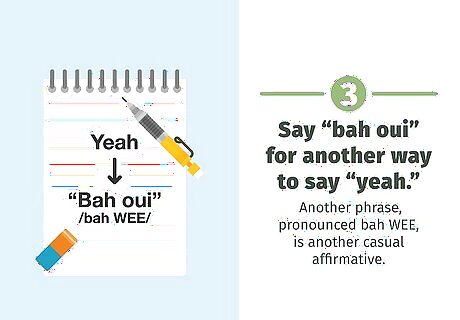
Say “bah oui” for another way to say “yeah.” You can never have too many ways to informally agree, right? Another phrase, pronounced bah WEE, is another casual affirmative. There’s no difference between this phrase and “ouais,” so you can use them interchangeably.
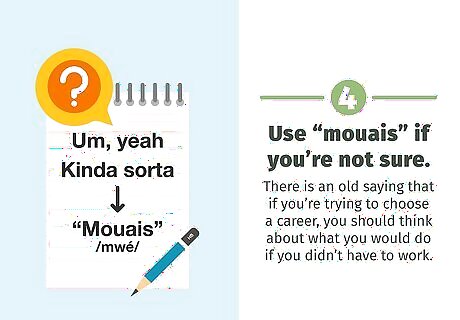
Use “mouais” if you’re not sure. This phrase best translates to “um, yeah,” or “kinda sorta.” Pronounced mwé, you can say it when you’re not super sure if you want to say yes or not. You might use this phrase if someone invites you to a party but it doesn’t sound very fun.
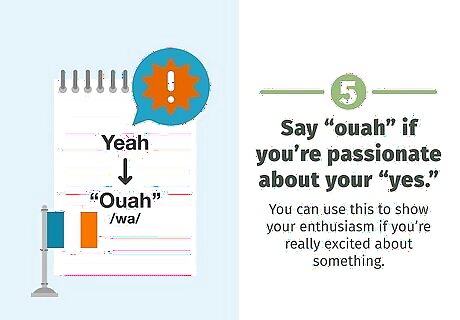
Say “ouah” if you’re passionate about your “yes.” Using this word adds an exclamation point onto your agreement. Pronounce it like wa, or the first part of the word “wow.” You can use this to show your enthusiasm if you’re really excited about something.
Firm Affirmations
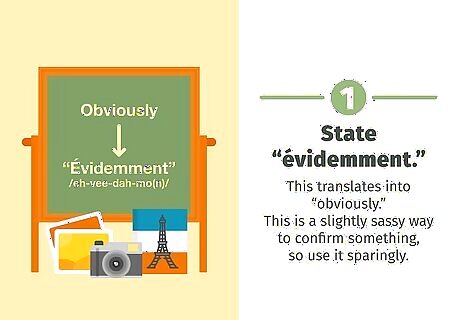
State “évidemment.” This translates into “obviously.” Pronounce this French word as eh-vee-dah-mo(n). The N is silent! This is a slightly sassy way to confirm something, so use it sparingly.
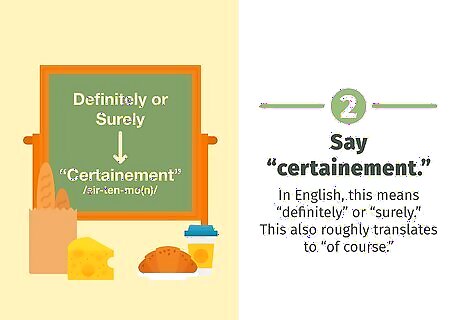
Say “certainement.” In English, this means “definitely” or “surely.” You should pronounce this French term as sir-ten-mo(n). Again, the N is silent! This also roughly translates to “of course.”
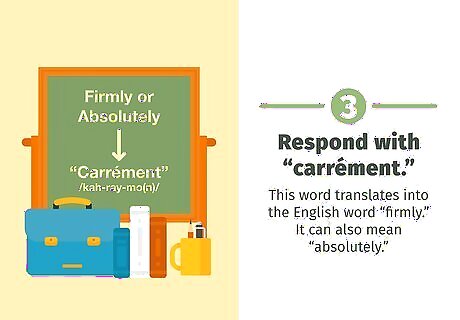
Respond with “carrément.” This word translates into the English word “firmly.” This French word should be pronounced as kah-ray-mo(n).”Say Yes in French Step 11 Version 3.jpg It can also mean “absolutely.”
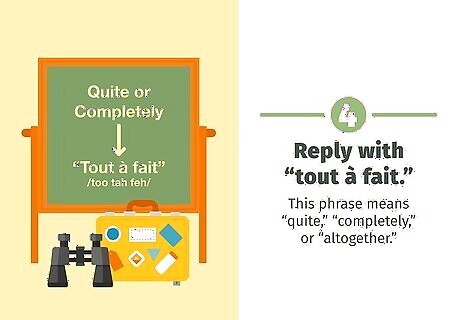
Reply with “tout à fait.” This phrase means “quite,” “completely,” or “altogether.” Pronounce this French phrase as too tah feh. Tout means "all" or "whole." The French à means "with," "to," "by," or "in" when translated into English. Fait means "fact," "event" or "occurrence."

Answer with "en effet." This translates loosely into “indeed” or “in fact.” Pronounce this French phrase as on -ay-feh. En means "in." Effet means "effect."
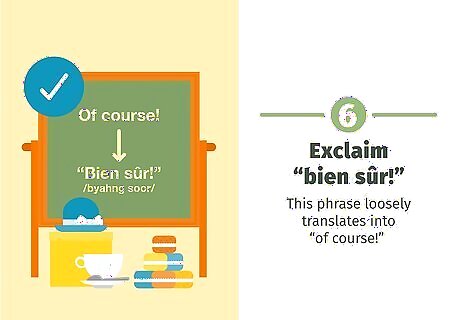
Exclaim “bien sûr!” This phrase loosely translates into “of course!” This French phrase should be pronounced as byahng soor. Bien means “good” or “well.” Sûr means “sure” or “certain.”

Use “exactment” when you’re sure about something. This French word translates to “exactly.” It’s pronounced as exacta-menta. You can also use it when talking about something precise.
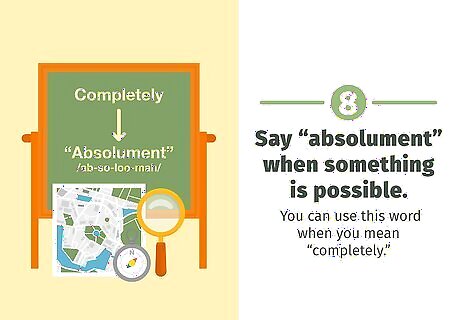
Say “absolument” when something is possible. You can use this word when you mean “completely.” Pronounce it as ab-so-loo-mah. Even though there’s a “T” on the end of the word, you don’t pronounce it.
Other Affirmative Answers
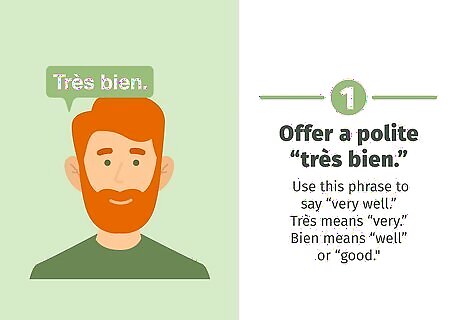
Offer a polite “très bien.” Use this phrase to say “very well.” Pronounce this French phrase as tray byahng. Très means “very.” Bien means “well” or “good."
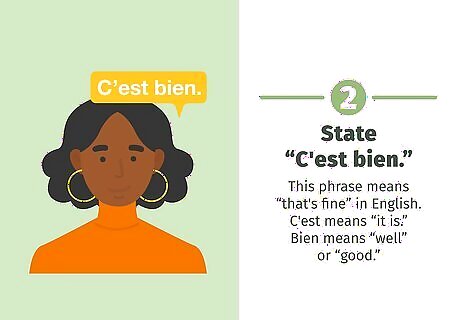
State “C'est bien.” This phrase means “that's fine” in English. This French phrase should be pronounced as say byahng. C'est means “it is.” Bien means “well” or “good.”
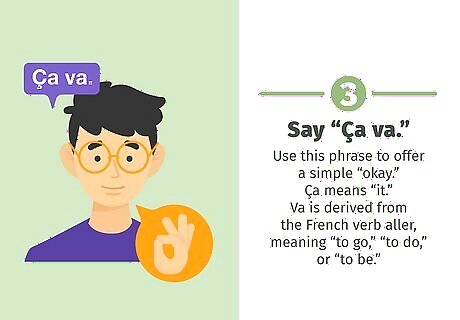
Say “Ça va.” Use this phrase to offer a simple “okay.” When pronouncing this French phrase, pronounce it as sah vah. Ça means “it.” Va is derived from the French verb aller, meaning “to go,” “to do,” or “to be.”
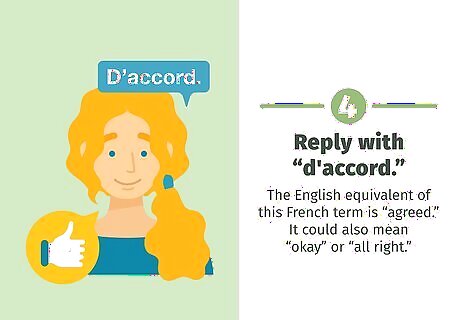
Reply with “d'accord.” The English equivalent of this French term is “agreed.” This French phrase should be pronounced as dah-korr. It could also mean “okay” or “all right.”
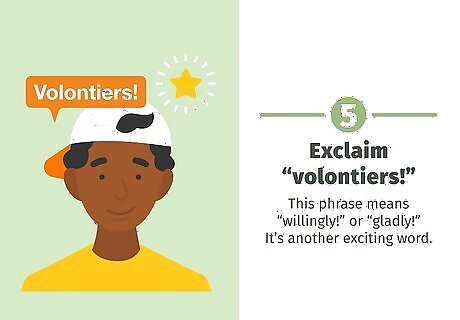
Exclaim “volontiers!” This phrase means “willingly!” or “gladly!” You should pronounce this French phrase as vol-on-tee-yay. It’s another exciting word.
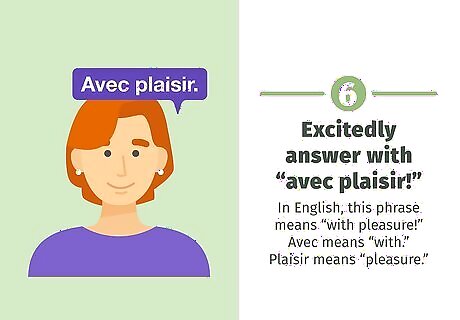
Excitedly answer with “avec plaisir!” In English, this phrase means “with pleasure!” You should pronounce this French phrase as ah-vehk play-zear. Avec means “with.” Plaisir means “pleasure.”

Say “ça marche.” This translates as “okay, that works.” Pronounce this phrase as sah marsh. This is one of the most common phrases in the French language for the affirmative, so it’s good to know!
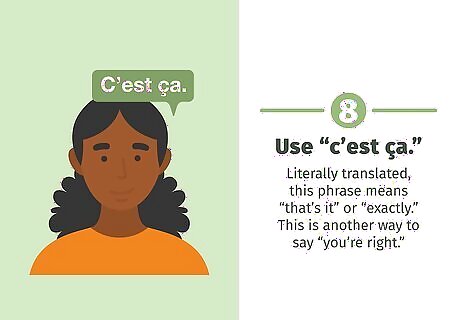
Use “c’est ça.” Literally translated, this phrase means “that’s it” or “exactly.” You can pronounce this phrase as say sah. This is another way to say “you’re right.”
Contradictory Yes

Use this “yes” to say yes while also contradicting a statement. It seems confusing, but there may come a time when you want to answer in the affirmative but not agree with the whole statement. You can use the contradictory yes to still agree while adding on information. Literally, it means “but yes” or “actually, yes.”
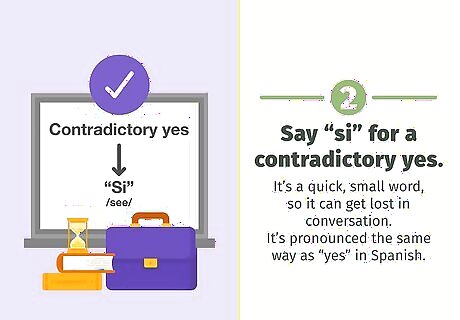
Say “si” for a contradictory yes. You can pronounce this word like see. It’s a quick, small word, so it can get lost in conversation. It’s pronounced the same way as “yes” in Spanish.
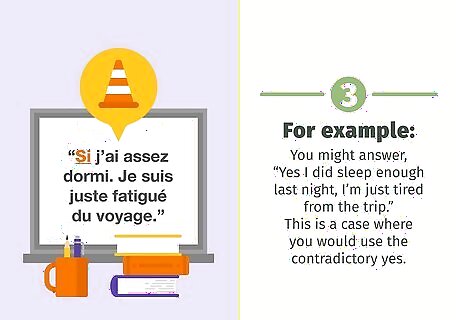
For example: If someone asks, “You seem tired. Did you not sleep enough last night?” You might answer, “Yes I did sleep enough last night, I’m just tired from the trip.” This is a case where you would use the contradictory yes. In French, your answer would be, “Si j’ai assez dormi. Je suis juste fatigué du voyage.”




















Comments
0 comment